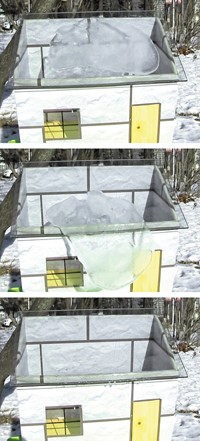Advertisement
Grab your lab coat. Let's get started
Welcome!
Welcome!
Create an account below to get 6 C&EN articles per month, receive newsletters and more - all free.
It seems this is your first time logging in online. Please enter the following information to continue.
As an ACS member you automatically get access to this site. All we need is few more details to create your reading experience.
Not you? Sign in with a different account.
Not you? Sign in with a different account.
ERROR 1
ERROR 1
ERROR 2
ERROR 2
ERROR 2
ERROR 2
ERROR 2
Password and Confirm password must match.
If you have an ACS member number, please enter it here so we can link this account to your membership. (optional)
ERROR 2
ACS values your privacy. By submitting your information, you are gaining access to C&EN and subscribing to our weekly newsletter. We use the information you provide to make your reading experience better, and we will never sell your data to third party members.
Materials
An Antismudge Coating Free Of Fluorine
Materials Science: Polyurethane-silicone coating wards off fingerprints, ink, paint, and water without persistent fluorine-based chemicals
by Bethany Halford
September 14, 2015
| A version of this story appeared in
Volume 93, Issue 36
To keep windows and walls free of stray marks and fingerprints, people often turn to antismudge coatings that are capable of repelling both water and oil. To date, however, most of these coatings have used fluorine-based chemicals to achieve their dual oleophobic and hydrophobic properties. Such chemicals can be expensive, and because they are extremely stable, they have been shown to accumulate in the environment. Seeking to prevent smudges without using fluorine-based materials, Muhammad Rabnawaz, Guojun Liu, and Heng Hu of Queen’s University, in Ontario, wondered if they could capitalize on reports that monolayers of poly(dimethylsiloxane), or PDMS, can repel both water and oily compounds. Not only is PDMS inexpensive, they reasoned, it is considered nontoxic and has been used in medical implants. The researchers created a clear polyurethane coating containing PDMS (Angew. Chem. Int. Ed. 2015, DOI: 10.1002/anie.201504892). Thanks to PDMS chains on its surface, the coating repels ink, paint, and fingerprints when applied to glass. Because the coating retains its properties even after extensive wear, the researchers suggest it would be useful for preventing smudges on handheld electronic devices, such as smartphones.





Join the conversation
Contact the reporter
Submit a Letter to the Editor for publication
Engage with us on Twitter